Getting Started with Chainlink Data Streams
This guide shows you how to read data from a Data Streams feed, validate the answer, and store the answer onchain. This guide uses the Remix IDE so you can complete these steps in a web-based development environment. If you prefer to complete these steps using terminal commands, read the Getting Started - Hardhat CLI guide instead.
This example uses a Chainlink Automation Log Trigger to check for events that require data. For this example, the log trigger comes from a simple emitter contract. Chainlink Automation then uses StreamsLookup to retrieve a signed report from the Data Streams Aggregation Network, return the data in a callback, and run the performUpkeep function on your registered upkeep contract. The performUpkeep function calls the verify function on the verifier contract.
Before you begin
- If you are new to smart contract development, learn how to Deploy Your First Smart Contract so you are familiar with the tools that are necessary for this guide:
- Acquire testnet funds. This guide requires testnet ETH and LINK on Arbitrum Sepolia.
- Use the Arbitrum Bridge to transfer testnet ETH from Ethereum Sepolia to Arbitrum Sepolia. Testnet ETH on Ethereum Sepolia is available at one of several faucets.
- Testnet LINK is available for Arbitrum Sepolia at faucets.chain.link.
- Learn how to Fund your contract with LINK.
Tutorial
Deploy the Chainlink Automation upkeep contract
Deploy an upkeep contract that is enabled to retrieve data from Data Streams. For this example, you will read from the ETH/USD feed with ID 0x000359843a543ee2fe414dc14c7e7920ef10f4372990b79d6361cdc0dd1ba782 on Arbitrum Sepolia. See the Stream Identifiers page for a complete list of available assets, IDs, and verifier proxy addresses.
-
Open the StreamsUpkeep.sol contract in Remix.
-
Select the
StreamsUpkeep.solcontract in the Solidity Compiler tab.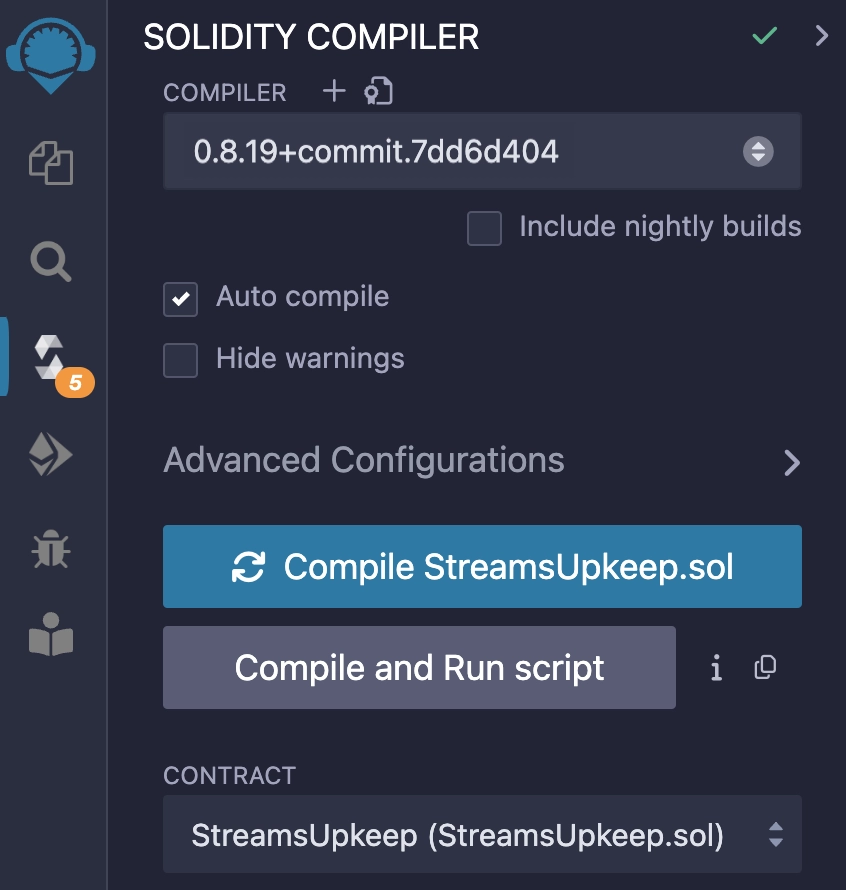
-
Compile the contract. You can ignore the warning messages for this example.
-
Open MetaMask and set the network to Arbitrum Sepolia. If you need to add Arbitrum Sepolia to your wallet, you can find the chain ID and the LINK token contract address on the LINK Token Contracts page.
-
On the Deploy & Run Transactions tab in Remix, select Injected Provider - MetaMask in the Environment list. Remix will use the MetaMask wallet to communicate with Arbitrum Sepolia.
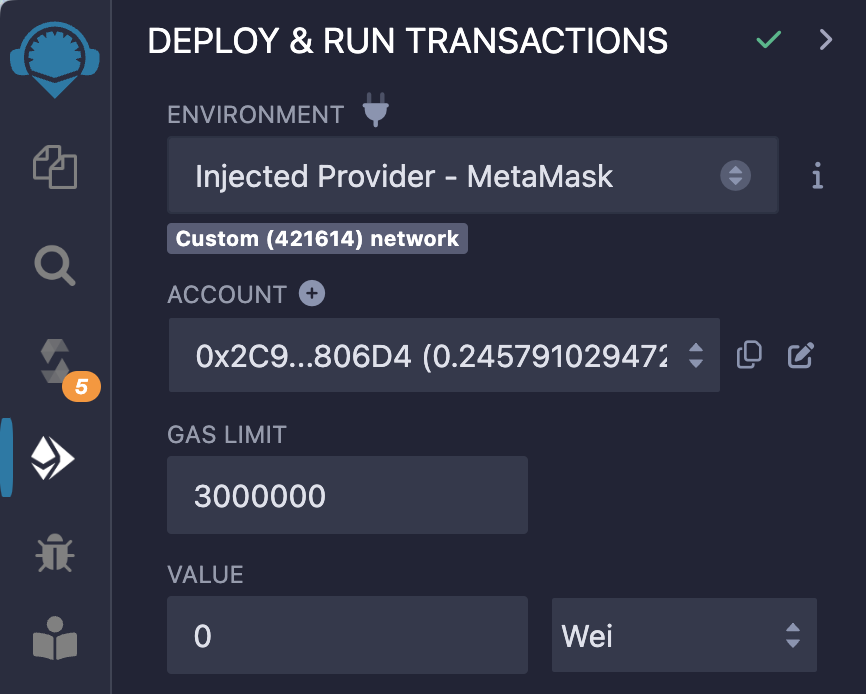
-
In the Contract section, select the
StreamsUpkeepcontract and fill in the verifier proxy address corresponding to the stream you want to read from. You can find this address on the Stream IDs page. The verifier proxy address for the ETH/USD feed on Arbitrum Sepolia is0x2ff010DEbC1297f19579B4246cad07bd24F2488A.
-
Click the Deploy button to deploy the contract. MetaMask prompts you to confirm the transaction. Check the transaction details to ensure you deploy the contract to Arbitrum Sepolia.
-
After you confirm the transaction, the contract address appears under the Deployed Contracts list in Remix. Save this contract address for later.

Deploy the emitter contract
This contract emits logs that trigger the upkeep. This code can be part of your dApp. For example, you might emit log triggers when your users initiate a trade or other action requiring data retrieval. For this Getting Started guide, use a very simple emitter so you can test the upkeep and data retrieval.
-
Open the LogEmitter.sol contract in Remix.
-
Under the Solidity Compiler tab, select the
0.8.19Solidity compiler and click the Compile LogEmitter.sol button to compile the contract.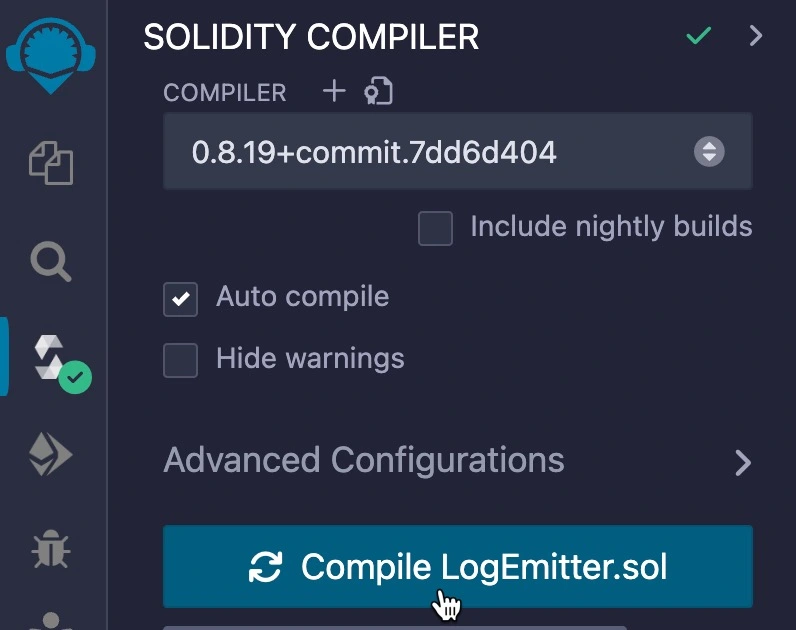
-
Open MetaMask and make sure the network is still set to Arbitrum Sepolia.
-
On the Deploy & Run Transactions tab in Remix, ensure the Environment is still set to Injected Provider - MetaMask.

-
Click the Deploy button to deploy the contract. MetaMask prompts you to confirm the transaction. Check the transaction details to ensure you deploy the contract to Arbitrum Sepolia.
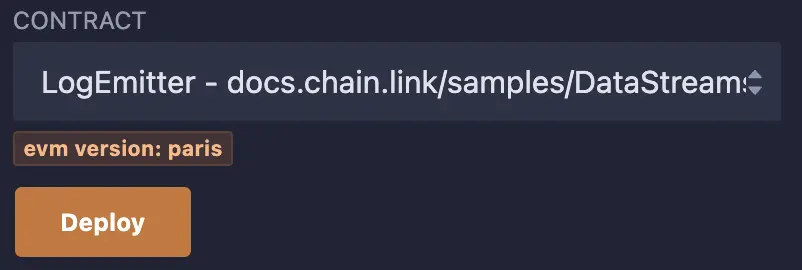
-
After you confirm the transaction, the contract address appears in the Deployed Contracts list. Save this contract address for later.

Register the upkeep
Register a new Log trigger upkeep. See Automation Log Triggers to learn more about how to register Log Trigger upkeeps.
-
Go to the Chainlink Automation UI for Arbitrum Sepolia and connect your browser wallet.
-
Click Register new Upkeep.
-
Select the Log trigger upkeep type and click Next.
-
Specify the upkeep contract address you saved earlier as the Contract to automate. In this example, you can ignore the warning about the Automation compatible contract verification. Click Next.
-
Specify the emitter contract address that you saved earlier. This tells Chainlink Automation what contracts to watch for log triggers. Then click Next.
-
Provide the ABI if the contract is not validated. To find the ABI of your contract in Remix, navigate to the Solidity Compiler tab. Then, copy the ABI to your clipboard using the button at the bottom of the panel.
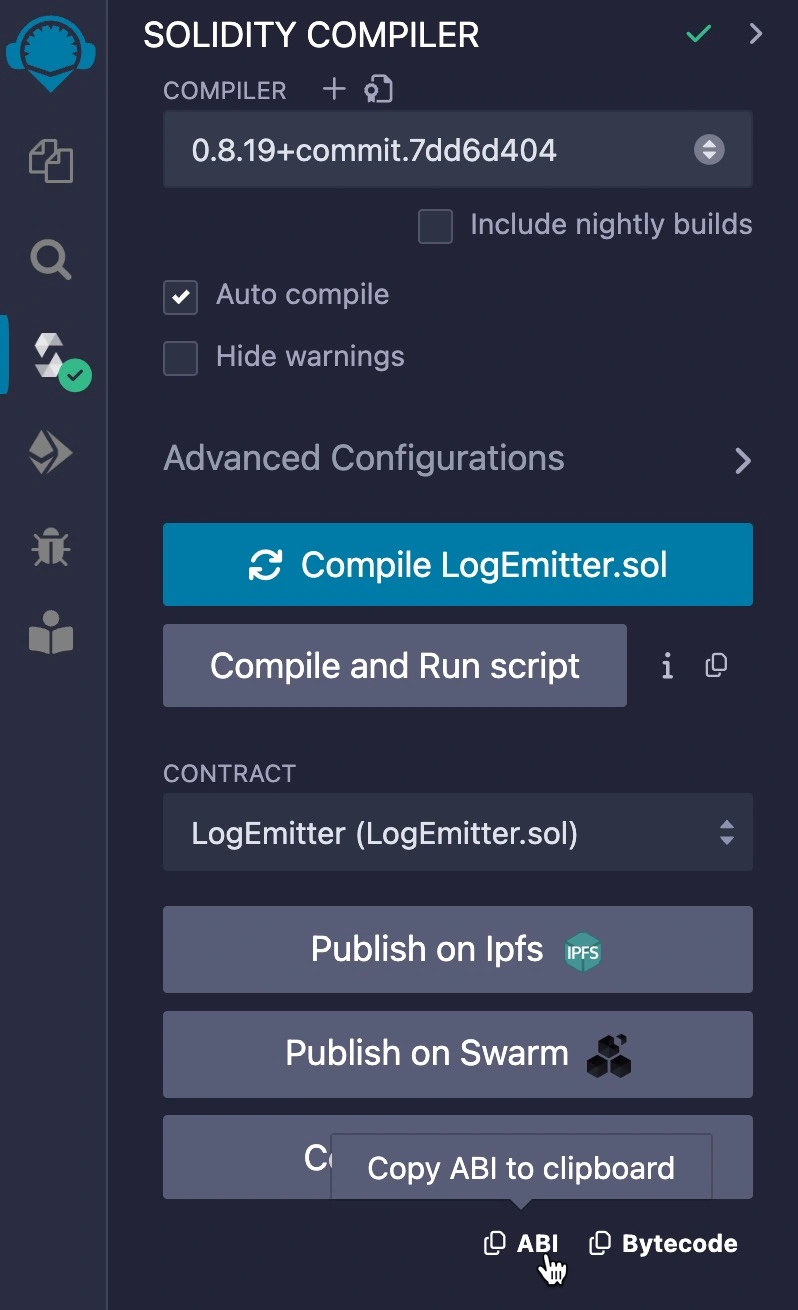
-
Select the
Logevent as the triggering event in the Emitted log dropdown. Log index topic filters are optional filters to narrow the logs you want to trigger your upkeep. For this example, leave the field blank. Click Next. -
Specify a name for the upkeep.
-
Specify a Starting balance of 1 testnet LINK for this example. You can retrieve unused LINK later.
-
Leave the Check data value and other fields blank for now, and click Register Upkeep. MetaMask prompts you to confirm the transaction. Wait for the transaction to complete.
Fund the upkeep contract
In this example, the upkeep contract pays for onchain verification of reports from Data Streams. The Automation subscription does not cover the cost.
Open MetaMask and send 1 testnet LINK on Arbitrum Sepolia to the upkeep contract address you saved earlier.
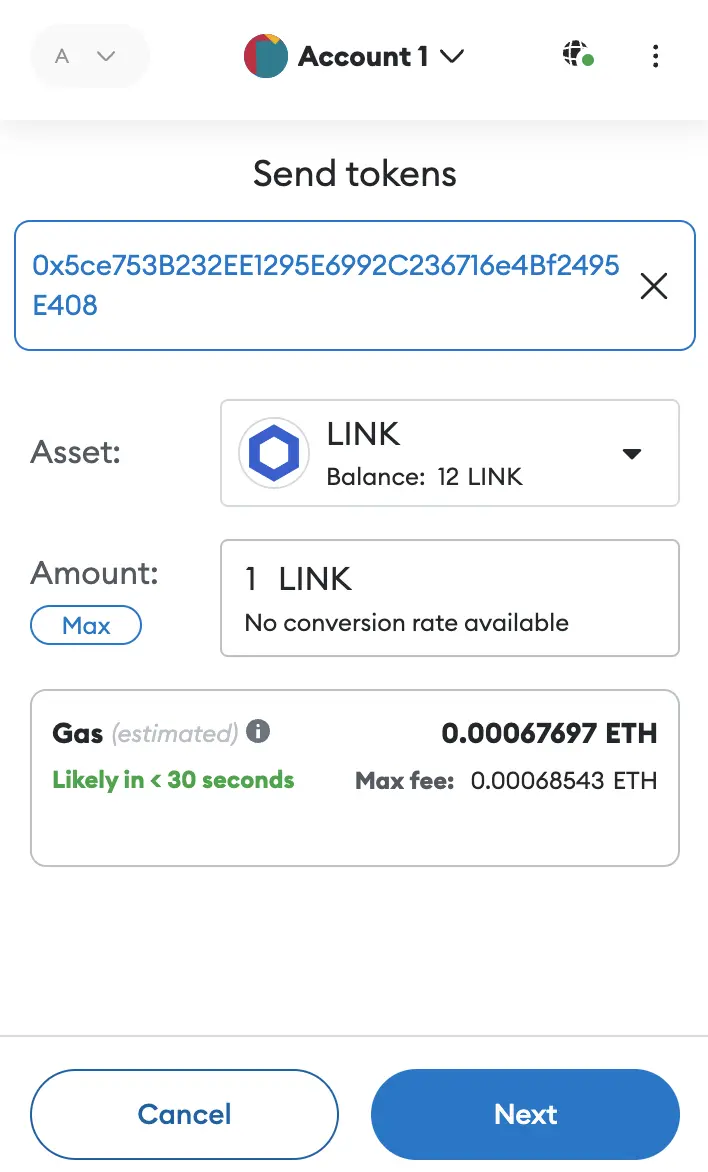
Emit a log
Now, you can use your emitter contract to emit a log and initiate the upkeep, which retrieves data for the specified Data Streams asset ID.
-
In Remix, on the Deploy & Run Transactions tab, expand your emitter contract under the Deployed Contracts section.
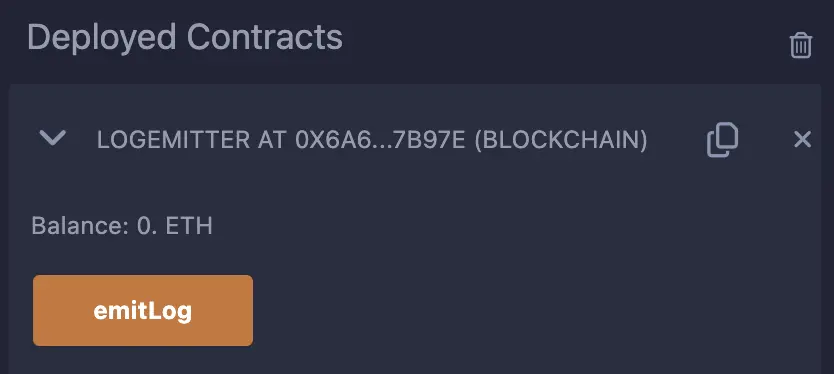
-
Click the
emitLogbutton to call the function and emit a log. MetaMask prompts you to accept the transaction.
After the transaction is complete, the log is emitted, and the upkeep is triggered. You can find the upkeep transaction hash in the Chainlink Automation UI. Check to make sure the transaction is successful.

View the retrieved price
The retrieved price is stored as a variable in the contract and emitted in the logs.
-
On the Deploy & Run Transactions tab in Remix, expand the details of your upkeep contract in the Deployed Contracts section.
-
Click the
last_retrieved_pricegetter function to view the retrieved price. The answer on the ETH/USD stream uses 18 decimal places, so an answer of248412100000000000indicates an ETH/USD price of 2484.121. Each stream uses a different number of decimal places for answers. See the Stream IDs page for more information.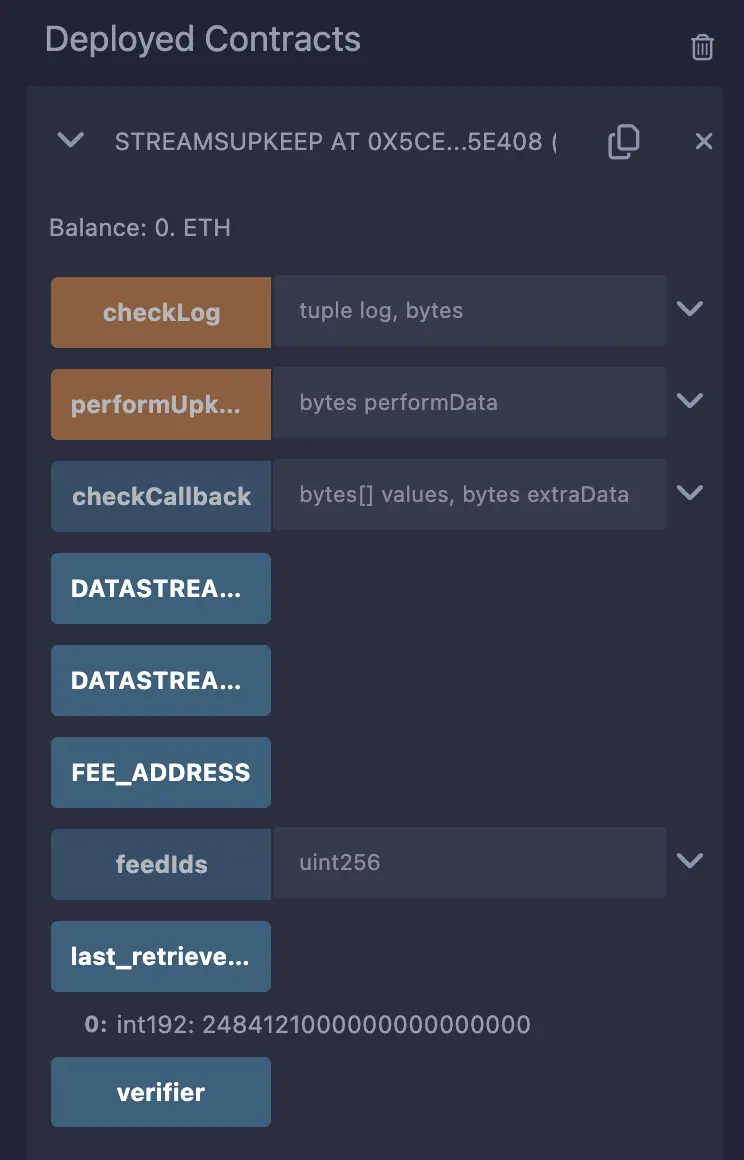
Alternatively, you can view the price emitted in the logs for your upkeep transaction. You can find the upkeep transaction hash at Chainlink Automation UI and view the transaction logs in the Arbitrum Sepolia explorer.
Examine the code
The example code you deployed has all the interfaces and functions required to work with Chainlink Automation as an upkeep contract. It follows a similar flow to the trading flow in the Architecture documentation but uses a basic log emitter to simulate the client contract that would initiate a StreamsLookup. The code example uses revert with StreamsLookup to convey call information about what streams to retrieve. See the EIP-3668 rationale for more information about how to use revert in this way.
// SPDX-License-Identifier: MIT
pragma solidity 0.8.19;
import {Common} from "@chainlink/contracts/src/v0.8/llo-feeds/libraries/Common.sol";
import {StreamsLookupCompatibleInterface} from "@chainlink/contracts/src/v0.8/automation/interfaces/StreamsLookupCompatibleInterface.sol";
import {ILogAutomation, Log} from "@chainlink/contracts/src/v0.8/automation/interfaces/ILogAutomation.sol";
import {IRewardManager} from "@chainlink/contracts/src/v0.8/llo-feeds/interfaces/IRewardManager.sol";
import {IVerifierFeeManager} from "@chainlink/contracts/src/v0.8/llo-feeds/interfaces/IVerifierFeeManager.sol";
import {IERC20} from "@chainlink/contracts/src/v0.8/vendor/openzeppelin-solidity/v4.8.3/contracts/interfaces/IERC20.sol";
/**
* THIS IS AN EXAMPLE CONTRACT THAT USES UN-AUDITED CODE FOR DEMONSTRATION PURPOSES.
* DO NOT USE THIS CODE IN PRODUCTION.
*/
// Custom interfaces for IVerifierProxy and IFeeManager
interface IVerifierProxy {
/**
* @notice Verifies that the data encoded has been signed.
* correctly by routing to the correct verifier, and bills the user if applicable.
* @param payload The encoded data to be verified, including the signed
* report.
* @param parameterPayload Fee metadata for billing. For the current implementation this is just the abi-encoded fee token ERC-20 address.
* @return verifierResponse The encoded report from the verifier.
*/
function verify(
bytes calldata payload,
bytes calldata parameterPayload
) external payable returns (bytes memory verifierResponse);
function s_feeManager() external view returns (IVerifierFeeManager);
}
interface IFeeManager {
/**
* @notice Calculates the fee and reward associated with verifying a report, including discounts for subscribers.
* This function assesses the fee and reward for report verification, applying a discount for recognized subscriber addresses.
* @param subscriber The address attempting to verify the report. A discount is applied if this address
* is recognized as a subscriber.
* @param unverifiedReport The report data awaiting verification. The content of this report is used to
* determine the base fee and reward, before considering subscriber discounts.
* @param quoteAddress The payment token address used for quoting fees and rewards.
* @return fee The fee assessed for verifying the report, with subscriber discounts applied where applicable.
* @return reward The reward allocated to the caller for successfully verifying the report.
* @return totalDiscount The total discount amount deducted from the fee for subscribers.
*/
function getFeeAndReward(
address subscriber,
bytes memory unverifiedReport,
address quoteAddress
) external returns (Common.Asset memory, Common.Asset memory, uint256);
function i_linkAddress() external view returns (address);
function i_nativeAddress() external view returns (address);
function i_rewardManager() external view returns (address);
}
contract StreamsUpkeep is ILogAutomation, StreamsLookupCompatibleInterface {
struct Report {
bytes32 feedId; // The feed ID the report has data for
uint32 validFromTimestamp; // Earliest timestamp for which price is applicable
uint32 observationsTimestamp; // Latest timestamp for which price is applicable
uint192 nativeFee; // Base cost to validate a transaction using the report, denominated in the chain’s native token (WETH/ETH)
uint192 linkFee; // Base cost to validate a transaction using the report, denominated in LINK
uint32 expiresAt; // Latest timestamp where the report can be verified onchain
int192 price; // DON consensus median price, carried to 8 decimal places
int192 bid; // Simulated price impact of a buy order up to the X% depth of liquidity utilisation
int192 ask; // Simulated price impact of a sell order up to the X% depth of liquidity utilisation
}
struct Quote {
address quoteAddress;
}
event PriceUpdate(int192 indexed price);
IVerifierProxy public verifier;
address public FEE_ADDRESS;
string public constant DATASTREAMS_FEEDLABEL = "feedIDs";
string public constant DATASTREAMS_QUERYLABEL = "timestamp";
int192 public last_retrieved_price;
// This example reads the ID for the ETH/USD report on Arbitrum Sepolia.
// Find a complete list of IDs at https://docs.chain.link/data-streams/stream-ids
string[] public feedIds = [
"0x000359843a543ee2fe414dc14c7e7920ef10f4372990b79d6361cdc0dd1ba782"
];
constructor(address _verifier) {
verifier = IVerifierProxy(_verifier);
}
// This function uses revert to convey call information.
// See https://eips.ethereum.org/EIPS/eip-3668#rationale for details.
function checkLog(
Log calldata log,
bytes memory
) external returns (bool upkeepNeeded, bytes memory performData) {
revert StreamsLookup(
DATASTREAMS_FEEDLABEL,
feedIds,
DATASTREAMS_QUERYLABEL,
log.timestamp,
""
);
}
/**
* @notice this is a new, optional function in streams lookup. It is meant to surface streams lookup errors.
* @return upkeepNeeded boolean to indicate whether the keeper should call performUpkeep or not.
* @return performData bytes that the keeper should call performUpkeep with, if
* upkeep is needed. If you would like to encode data to decode later, try `abi.encode`.
*/
function checkErrorHandler(
uint256 /*errCode*/,
bytes memory /*extraData*/
) external pure returns (bool upkeepNeeded, bytes memory performData) {
return (true, "0");
// Hardcoded to always perform upkeep.
// Read the StreamsLookup error handler guide for more information.
// https://docs.chain.link/chainlink-automation/guides/streams-lookup-error-handler
}
// The Data Streams report bytes is passed here.
// extraData is context data from feed lookup process.
// Your contract may include logic to further process this data.
// This method is intended only to be simulated offchain by Automation.
// The data returned will then be passed by Automation into performUpkeep
function checkCallback(
bytes[] calldata values,
bytes calldata extraData
) external pure returns (bool, bytes memory) {
return (true, abi.encode(values, extraData));
}
// function will be performed onchain
function performUpkeep(bytes calldata performData) external {
// Decode the performData bytes passed in by CL Automation.
// This contains the data returned by your implementation in checkCallback().
(bytes[] memory signedReports, bytes memory extraData) = abi.decode(
performData,
(bytes[], bytes)
);
bytes memory unverifiedReport = signedReports[0];
(, /* bytes32[3] reportContextData */ bytes memory reportData) = abi
.decode(unverifiedReport, (bytes32[3], bytes));
// Report verification fees
IFeeManager feeManager = IFeeManager(address(verifier.s_feeManager()));
IRewardManager rewardManager = IRewardManager(
address(feeManager.i_rewardManager())
);
address feeTokenAddress = feeManager.i_linkAddress();
(Common.Asset memory fee, , ) = feeManager.getFeeAndReward(
address(this),
reportData,
feeTokenAddress
);
// Approve rewardManager to spend this contract's balance in fees
IERC20(feeTokenAddress).approve(address(rewardManager), fee.amount);
// Verify the report
bytes memory verifiedReportData = verifier.verify(
unverifiedReport,
abi.encode(feeTokenAddress)
);
// Decode verified report data into a Report struct
Report memory verifiedReport = abi.decode(verifiedReportData, (Report));
// Log price from report
emit PriceUpdate(verifiedReport.price);
// Store the price from the report
last_retrieved_price = verifiedReport.price;
}
fallback() external payable {}
}
Initializing the upkeep contract
When deploying the contract, you define the verifier proxy address for the Data Streams feed you want to read from. You can find this address on the Data Streams Feed IDs page. The verifier proxy address provides functions that are required for this example:
- The
s_feeManagerfunction to estimate the verification fees. - The
verifyfunction to verify the report onchain.
Emitting a log, retrieving, and verifying the report
After registering your upkeep contract with Chainlink Automation with a log trigger, you can emit a log with the emitLog function from your emitter contract.
- The emitted log triggers the Chainlink Automation upkeep.
- Chainlink Automation then uses
StreamsLookupto retrieve a signed report from the Data Streams Aggregation Network, returns the data in a callback (checkCallback), and runs theperformUpkeepfunction on your registered upkeep contract. - The
performUpkeepfunction calls theverifyfunction on the verifier contract to verify the report onchain. - In this example, the
performUpkeepfunction also stores the price from the report in thelast_retrieved_pricestate variable and emits aPriceUpdatelog message with the price.
Viewing the retrieved price
The last_retrieved_price getter function of your upkeep contract retrieves the last price stored by the performUpkeep function in the last_retrieved_price state variable of the StreamsUpkeep contract. Additionally, the performUpkeep function emits a PriceUpdate log message with the retrieved price.
Optional: Handle Data Streams fetching errors offchain with checkErrorHandler
When Automation detects the triggering event, it runs the checkLog function of your upkeep contract, which includes a StreamsLookup revert custom error. The StreamsLookup revert enables your upkeep to fetch a report from Data Streams. If the report is fetched successfully, the checkCallback function is evaluated offchain. Otherwise, the checkErrorHandler function is evaluated offchain to determine what Automation should do next.
In this example, the checkErrorHandler is set to always return true for upkeepNeeded. This implies that the upkeep is always triggered, even if the report fetching fails. You can modify the checkErrorHandler function to handle errors offchain in a way that works for your specific use case. Read more about using the StreamsLookup error handler.